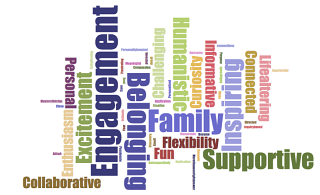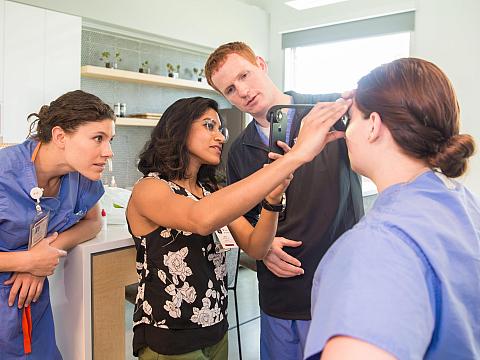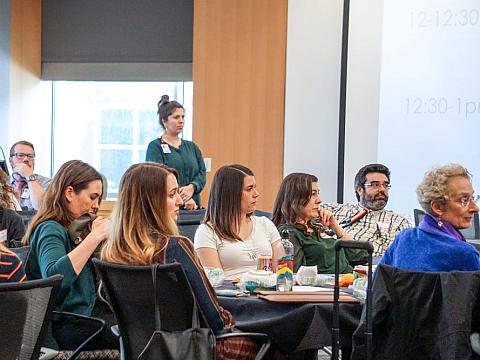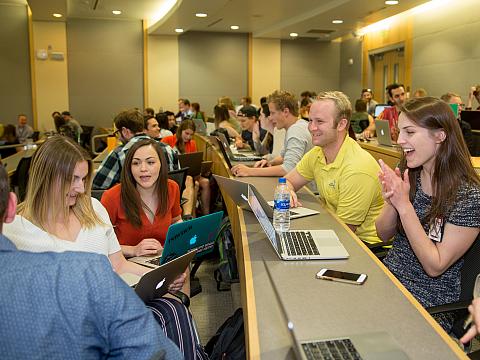
Exceptional Learning Experience

Exceptional Learning Experience
Strategically Transforming Medical Education
As medicine and health care continue to evolve, the nature of medical education is also changing. Medical schools have an obligation, rooted in their missions, to train students and educators to be prepared for this changing landscape.
The School of Medicine (SOM) is undertaking a strategic transformation process in education starting in 2019 to emphasize community, relationships, and professionalism in the learning culture. The initiative is called the Exceptional Learning Experience (ELE) and will be linked to University of Utah’s Exceptional Education Experience.
The transformation effort will have roughly three phases to occur between mid-2019 and end-2021.
The Why
Responding to Current Challenges in Health Care Through Education (The “WHY)
Through excellence in patient care, research, education and service to our communities, University of Utah Health is recognized nationally as a leader in transforming heath care. By embracing the principle of value-based health care, U of U Health has focused on the “exceptional patient experience” as a transformational strategy. Outside the clinical system, administrators, researchers, and educators are similarly driven to continuously improve health care education.
Just as the health system seeks exceptional quality, value, and satisfaction for patients, an obligation exists to provide a valuable and transformative educational experience for students. Schools around the country are crafting learning environments that deliver value to students by promoting higher levels of learning and professionalism, which ultimately lead to better patient care.
To keep up with emerging trends in education, medical schools across the country, including the University of Utah, are adopting new methods. As education shifts toward team- and case-based learning, faculty must adapt to become proficient in new modes of education—including online content, small-group facilitation, and understanding generational differences. By adopting new methods of teaching and learning, the School of Medicine has achieved many significant milestones in recent years. These include creating the core educator model, introducing team-based pedagogies, and launching the Pathways program.
As a result, our students have enjoyed a higher degree of performance and success—like improved Step exam scores and matching into excellent residency programs—and higher satisfaction with the overall program. However, the same challenges that physicians encounter are also emerging as issues that medical education must address: overwork, disconnection, lack of meaningful contact with colleagues, and too much time spent in front of a screen with EHRs or memorizing course material.
This has eroded the quality of practice and learning in our academic learning environment. The School of Medicine is undertaking a strategic transformation process in education to re-establish meaningful relationships, community, and professionalism in the learning culture. The initiative is called the Exceptional Learning Experience (ELE) and aligns with the University of Utah’s Exceptional Education Experience.
The What
Creating the Exceptional Learning Experience (The “WHAT”)
The Exceptional Learning Experience (ELE) represents a major culture shift in university medical education. The curriculum is moving away from the imposing, one-size-fits-all models of the past. The ELE is the foundation for creating an education system that develops self-motivated, system-thinking, patient-centered, evidence-based, life-long learners. This is achieved through a caring, relationship-based, collaborative learning environment that is simultaneously challenging and supportive.
By mirroring lessons learned from the Exceptional Patient Experience, the ELE seeks to put students and their educational experience squarely in focus. The driving principle and motto for the Exceptional Patient Experience became: “Medical care can only be truly great if the patient thinks it is. (A. Lorris Betz, MD, PhD).” When adapted to the ELE, this becomes: “Medical Education can only be truly great if the learner thinks it is.”
The ELE is at the confluence of student-centeredness and patient-centeredness. It emphasizes a personalized yet professional approach to education that focuses on the value of community and relationships among faculty, students, and patients. When provided with an appropriate balance of challenge, support, and mentorship, students will be successful at placing the patient (rather than themselves) at the center of their work.
The How & When
Transforming the Culture of Learning (The “HOW” and “WHEN”)
Transforming the culture of medical education requires leadership, curriculum change, and systems thinking.
Since 2018, the School of Medicine (SOM) has been cultivating a community of core educators who are invested in the ELE. Core educators have been working with SOM administration, university partners, and students to collaboratively define the vision, objectives, and key strategic elements of the ELE.
With grant support from the American Medical Association, we have gained a better understanding of how we are spending our education resources. This has led to a cultural change among administration, faculty, staff, and students to begin considering the “value” of various parts of our curriculum. We are currently working on a blueprint for curriculum reform that improves the learning culture through systems thinking and dialogue.
What would medical education look like if relationships, community, and professional identity were truly at the center? Adopting a systems thinking approach to education helps us recognize the complicated relationships among the people and processes within the organization. It challenges us to consider the deep systemic causes (like culture) and the complex interactions of the medical education system which are creating our current problems, and which hold the key to the solutions. Systems thinking views the student as the end user and actively engages them in change and decision making.
Transforming culture is an ongoing process. Faculty, students, the health system, the university, and the community will be engaged in a three-part transformation:
- 2019: Defining the Exceptional Learning Experience
- 2020-2021: Designing the Exceptional Learning Experience
- 2021: Launching the Exceptional Learning Experience
The Who
Partnering to Co-Create the Future (The “WHO”)
For decades, University of Utah Health has cultivated a culture of collaboration where groundbreaking research discoveries and innovation can flourish. Defining the way forward for medical education transformation will require staying true to our roots. We will continue to engage SOM faculty, administration, students, and university partners to collaboratively define the vision, objectives, and key strategic elements of the Exceptional Learning Experience.
A partnership between the stakeholders in the learning experience is fundamental to change. This acknowledges the student as a capable partner—capable of self-direction, innovation and co-creating the environment in which they learn.
At the heart of the Exceptional Leaning Experience is the belief that:
- Our students deserve to have an exceptional experience,
- Our faculty deserve to have an exceptional experience with our students, and
- Future patients deserve to be on the receiving end of this exceptional experience.
Mededmorphosis
Realizing the Exceptional Learning Experience
In response to internal and external opportunities for growth, and as part of the OneU Strategy Refresh, School of Medicine leaders launched MedEdMorphosis in 2021. This comprehensive campaign aims to refresh and unify the medical education program.



